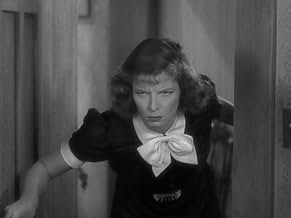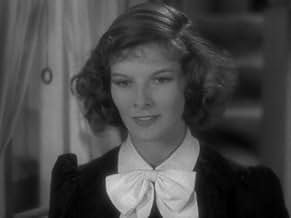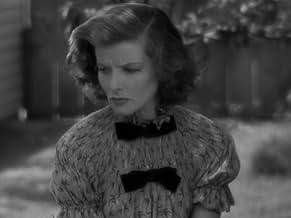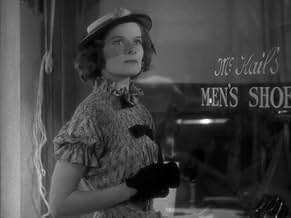NOTE IMDb
6,9/10
4,7 k
MA NOTE
Ajouter une intrigue dans votre langueA working-class girl is thwarted and embarrassed in her attempts to move up socially by her gauche family and unstable father.A working-class girl is thwarted and embarrassed in her attempts to move up socially by her gauche family and unstable father.A working-class girl is thwarted and embarrassed in her attempts to move up socially by her gauche family and unstable father.
- Nommé pour 2 Oscars
- 1 victoire et 3 nominations au total
Hattie McDaniel
- Malena
- (as Hattie McDaniels)
Brooks Benedict
- Henrietta's Dance Partner
- (non crédité)
Harry Bowen
- Laborer Putting Up Sign
- (non crédité)
Steve Carruthers
- Party Guest
- (non crédité)
Monte Carter
- Waiter at Restaurant
- (non crédité)
George Ford
- Party Guest
- (non crédité)
Joe Gilbert
- Party Guest
- (non crédité)
Histoire
Le saviez-vous
- AnecdotesThough Bette Davis won the 1935 Academy Award/Oscar for L'Intruse (1935) beating out Katharine Hepburn in Désirs secrets (1935), Davis was noted for saying more than once that she didn't deserve the award that year and that the one who did was Katharine Hepburn.
- GaffesWhen Alice walks with Arthur toward her house for the first time, a woman watering her shrubs can be seen and a letter carrier walks up, then back down her porch steps twice. The background scene repeats itself, letter carrier, woman setting down hose, etc. The letter carrier approaches Alice moments later where she then has to shamefully admit to Arthur that this is, indeed, her house that she is in front of. Likely a rear projection scene that was duplicated.
- Citations
Mrs. Adams: Malena fell down the cellar stairs!
Virgil Adams: Did she break any of our things?
- ConnexionsFeatured in George Stevens: A Filmmaker's Journey (1984)
Commentaire à la une
When I first watched this film, despite the fact that George Steven's excellent direction makes a rather mundane plot into a very involving film, I was a bit thrown off by the actor who plays Katherine Hepburn's ailing father. About midway through the film I thought: "this guy's not much of an actor...".
However, by the time the film was over, I was completely captivated by the man, mostly due to his big confrontation scene with his boss near the end--in fact, I think I re-played that scene five times to really appreciate it's emotional power. And it is because of Mr. Fred Stone's performance in that scene that "Alice Adams" remains one of my very favorite films.
And who was the man? Well, anyone viewing "Alice Adams" is watching a rare document of American theatrical history. Fred Stone was born in 1873, actually traveled west with his family in a covered wagon, became a circus performer, acrobat, dancer, clown and expert "eccentric dancer." He knew Will Rogers and Annie Oakley, and became a MAJOR musical theater star in the early 20th-century. His most famous role was that of the ORIGINAL SCARECROW in the very first (1902) stage version of the WIZARD of OZ. As a young man Ray Bolger saw the production in Boston, and began to pursue his own "eccentric dancing" career, becoming immortalized himself as the Scarecrow in the 1939 MGM film.
In "Alice Adams", Fred Stone gives a remarkably sympathetic and honest performance, a simple, rather shy and utterly unpretentious Everyman, who, though convalescing from some undisclosed illness, must constantly endure the brow-beatings and guilt trips laid upon him by his nagging wife. By the end of the film, having become entangled in a business venture for which he seems totally unqualified and outraged by his son's thievery, he confronts his own boss in his living room for his big emotional scene. I remember reading in Mr. Stone's autobiography that George Stevens and Katherine Hepburn were so impressed by his performance in this scene that they actually EXPANDED his part in it to give him more screen time.
After Katherine Hepburn steps in to smooth things over with the boss, she has a final tender scene with Mr. Stone, one of those achingly beautiful scenes (with a lovely background score) that brings tears to the eye because of its sincerity and simplicity. You won't find anything like it in any film of the last 40 years--many imitations, yes---but not the REAL thing.
Oh yes, there's Katherine Hepburn too, in a role that requires her to act flighty and charming in an annoyingly overwrought way---a little of it goes a VERY long way. Still, she's lovely. Other stand-outs include Alice's smart-aleck brother, played by Frank Albertson, an appealing light comedy/musical theater guy BEST KNOWN for 2 roles: as Sam "hee-haw" Wainwright in "It's a Wonderful Life" and as the lecherous businessman who gives Janet Leigh the $40,000 in the second scene of "Psycho" (he really had aged a lot by 1959). Also, Charley Grapewin, best-known as Uncle Henry in the 1939 "Wizard of OZ" has a chance to shine as Mr. Stone's slightly cantankerous but generous and warm-hearted boss, Mr. Lamb.
"Alice Adams" is not for everyone; it's a low-key, genteel film about the problems of small-town people who are moving up in the social world and the one family that gets left behind. But thanks to George Steven's sensitive and compelling direction, the film transcends it very earthbound plot and becomes, at least for some of us, a very involving cinematic treasure.
However, by the time the film was over, I was completely captivated by the man, mostly due to his big confrontation scene with his boss near the end--in fact, I think I re-played that scene five times to really appreciate it's emotional power. And it is because of Mr. Fred Stone's performance in that scene that "Alice Adams" remains one of my very favorite films.
And who was the man? Well, anyone viewing "Alice Adams" is watching a rare document of American theatrical history. Fred Stone was born in 1873, actually traveled west with his family in a covered wagon, became a circus performer, acrobat, dancer, clown and expert "eccentric dancer." He knew Will Rogers and Annie Oakley, and became a MAJOR musical theater star in the early 20th-century. His most famous role was that of the ORIGINAL SCARECROW in the very first (1902) stage version of the WIZARD of OZ. As a young man Ray Bolger saw the production in Boston, and began to pursue his own "eccentric dancing" career, becoming immortalized himself as the Scarecrow in the 1939 MGM film.
In "Alice Adams", Fred Stone gives a remarkably sympathetic and honest performance, a simple, rather shy and utterly unpretentious Everyman, who, though convalescing from some undisclosed illness, must constantly endure the brow-beatings and guilt trips laid upon him by his nagging wife. By the end of the film, having become entangled in a business venture for which he seems totally unqualified and outraged by his son's thievery, he confronts his own boss in his living room for his big emotional scene. I remember reading in Mr. Stone's autobiography that George Stevens and Katherine Hepburn were so impressed by his performance in this scene that they actually EXPANDED his part in it to give him more screen time.
After Katherine Hepburn steps in to smooth things over with the boss, she has a final tender scene with Mr. Stone, one of those achingly beautiful scenes (with a lovely background score) that brings tears to the eye because of its sincerity and simplicity. You won't find anything like it in any film of the last 40 years--many imitations, yes---but not the REAL thing.
Oh yes, there's Katherine Hepburn too, in a role that requires her to act flighty and charming in an annoyingly overwrought way---a little of it goes a VERY long way. Still, she's lovely. Other stand-outs include Alice's smart-aleck brother, played by Frank Albertson, an appealing light comedy/musical theater guy BEST KNOWN for 2 roles: as Sam "hee-haw" Wainwright in "It's a Wonderful Life" and as the lecherous businessman who gives Janet Leigh the $40,000 in the second scene of "Psycho" (he really had aged a lot by 1959). Also, Charley Grapewin, best-known as Uncle Henry in the 1939 "Wizard of OZ" has a chance to shine as Mr. Stone's slightly cantankerous but generous and warm-hearted boss, Mr. Lamb.
"Alice Adams" is not for everyone; it's a low-key, genteel film about the problems of small-town people who are moving up in the social world and the one family that gets left behind. But thanks to George Steven's sensitive and compelling direction, the film transcends it very earthbound plot and becomes, at least for some of us, a very involving cinematic treasure.
Meilleurs choix
Connectez-vous pour évaluer et suivre la liste de favoris afin de recevoir des recommandations personnalisées
Détails
- Date de sortie
- Pays d’origine
- Langue
- Aussi connu sous le nom de
- Alice Adams
- Lieux de tournage
- Société de production
- Voir plus de crédits d'entreprise sur IMDbPro
- Durée1 heure 39 minutes
- Couleur
- Rapport de forme
- 1.37 : 1
Contribuer à cette page
Suggérer une modification ou ajouter du contenu manquant

Lacune principale
By what name was Désirs secrets (1935) officially released in India in English?
Répondre



































